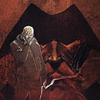Hi
Im doing a fantasy turnbased tactical RPG, with some elements from "Darkest Dungeon", "Battlebrothers" and tabletop games like "Hero Quest". You control up to 6 heroes in your party and travel a simplified overhead map where you can harvest resources, fight roaming bandits, visit hamlets (get new recruits, visit trader, crafting etc) and attempt to "clear dungeons". The last part is the main part of the game.
Dungeons are similar to in "Darkest Dungeon". They are randomly generated according to their type (cave, crypt, abandoned keep etc) and features corridors and rooms including stuff like:
fighting groups of enemies (main gameplay element)
dealing with traps
dealing with obstacles such as locked doors
A player can abandon a dungeon (go back to the map, for example to avoid getting heroes killed) but then that dungeon will remain "explored" and the player cannot enter again to try and get the "completion loot" (which is some better loot/reward if completing the dungeon).
-----
How to "complete" a dungeon? I have some ideas but want more input. The completion-requirement can be generated along with the dungeon content itself.
- Explore (visit 80 % of the rooms, the last room will be a treasury with some nice stuff and maybe extra monsters?)
- Locked treasury (one room contain the key, another room is locked and contrain the treasury)
- Find the boss (one room contain a Boss monster, kill it to complete the dungeon)
What else could there be as "objectives"? What seems fun or suitable? And what about the ideas I have already?











